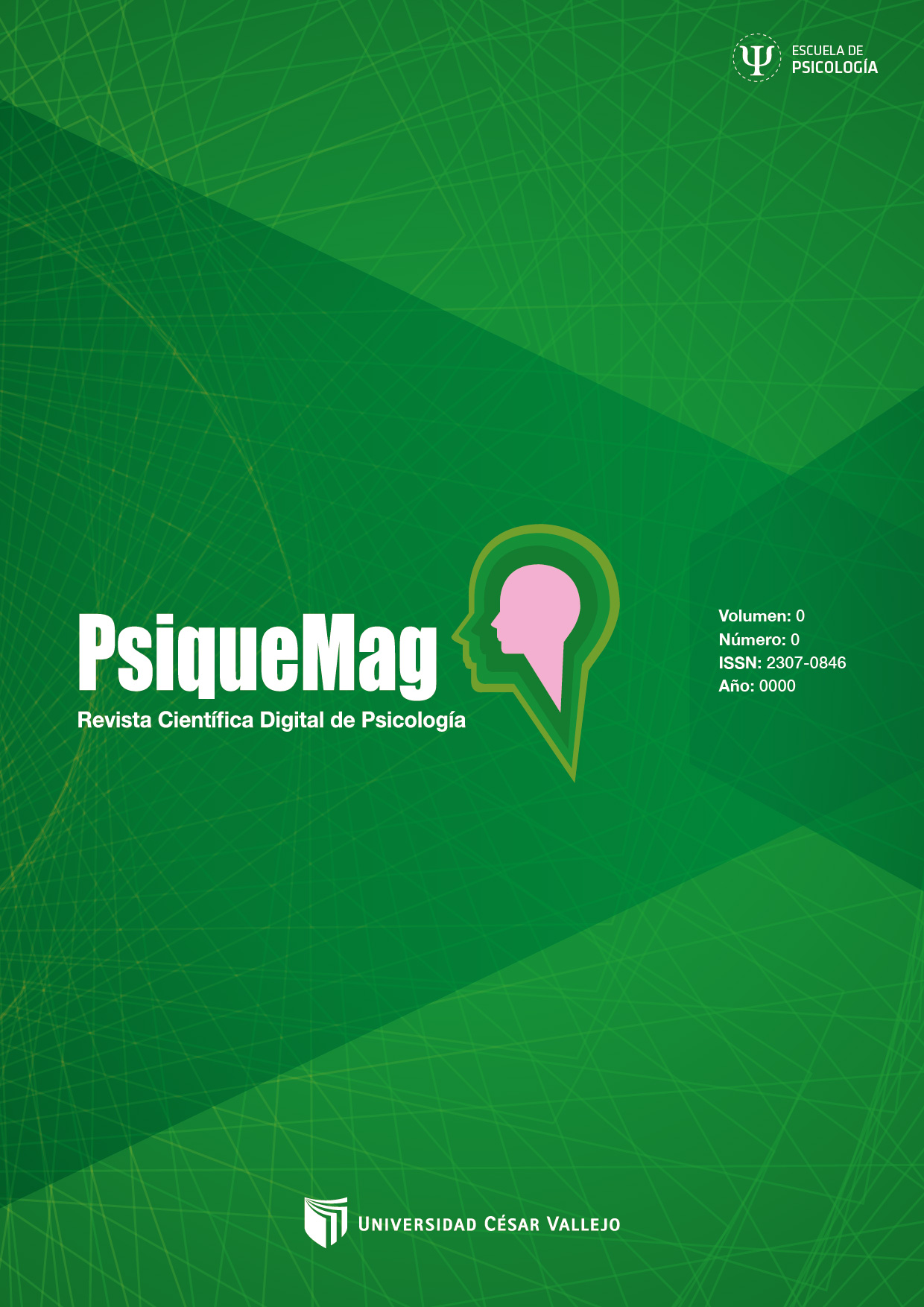Family Belief System and Infidelity in Cohabiting Couples in Tarapoto
DOI:
https://doi.org/10.18050/psiquemag.v12i1.2490Keywords:
infidelidad, creencias, familiares, géneroAbstract
This article analyzes and explains the link between the family belief system and infidelity in cohabiting couple who receive assistance in a public institution in Tarapoto – Perú. The objective of the study was to explore and publicize the influence of family belief systems on infidelity behaviors. This study was carried out using the qualitative method. The analysis of the results of the individual in-depth interviews with both members of the couple was framed in a systemic approach. From the investigation, it was obtained that there are similarities between the members of the couple regarding their beliefs, which generates a greater tolerance towards unfaithful male behavior. In other words, there is an affinity in the beliefs of men and women about: gender roles, love family, biological differences between men and women among others. Personal, family y social beliefs are deep-rooted
and are hardly questioned, but tend to be reinforced. In t[his sense, the research allowed to approach a better understanding of the relationship between the belief system and unfaithful behavior, both in men and women. This study will help to gain an in-depth understanding of this psychosocial reality, which affects people is psychological well-being.
Downloads
References
Baralia, M., Mansilla, M. & Lora, V. (1982). Infidelidad. Cendoc.
Bourdieu, P. [1998] (2000). La dominación masculina. Anagrama.
Bustamante, M. (1990). Actitudes Psicosociales frente al machismo en un grupo de mujeres de diferente nivel socioeconómico perteneciente a la provincia de Cañete-Lima. [Tesis de Licenciatura en Psicología]: Universidad Particular San Martin de Porres. https://hdl.handle.net/20.500.12692/29222
Cabanellas, G. (1989). Diccionario enciclopédico de derecho usual. Heliasta.
Dallos, R. (1996). Sistemas de Creencias Familiares: Terapia y Cambio. Paidós.
De Beauvoir, S. ([1949] 2017). El Segundo Sexo: Los Hechos y los Mitos. Cátedra.
De Irala, J. (2012). Promiscuidad e Infidelidad: Efectos Colaterales sobre la Salud. [Simposio]. Palacio de congresos de Madrid.
Esteban, M. (2004). Antropología del Cuerpo: Género, itinerarios corporales, identidad y cambio. Bellaterra.
Fleche, C. & Olivier, F. (2010). Creencias y Terapia: Cómo modificar nuestras creencias para recuperar la libertad. Selector.
Fuentes, A.(2013). Percepción de la Infidelidad en el Área Metropolitana de Buenos Aires. [V Congreso Internacional de Investigación y Práctica Profesional en Psicología XX: IX Encuentro de Investigadores en Psicología del MERCOSUR]. Universidad de Buenos Aires.
García, E. (2021). Constelaciones de Pareja. Exposición en Formación Avanzada de Constelaciones Familiares. ICME.
Gottman, J. & Silver, N. (2012). Qué hacer para que el amor perdure: Cómo crear confianza y evitar la traición en la pareja. Paidós.
Gonzales, F (2020). Infidelidad: Diferencias de Género y Estrategias de Afrontamiento. https://repository.ucatolica.edu.co/bitstream/10983/25282/1/LA%20INFIDELIDAD-
Glass, S. (2004). Not "Just Friends": Rebuilding Trust and Recovering Your Sanity After Infidelity.
Hannah, B (2010). El viaje interior. Fata Morgana.
Herrera, S. (2010). Infidelidad: Proceso natural del ser, realidad social y sufrimiento garantizado. Revista de la Universidad Autónoma del Estado de Hidalgo.
Hite, S. (1982). The Hite Report on Male Sexuality. The Journal of Sex Research. https://tallirosenbaum.com/wp-content/uploads/2019/10/shere-hite-the-hite-report.pdf
Zwig, C . & Abrams, J. (2014). Encuentro con la Sombra. Kairós.
León, O. & Montero I. (2012). Métodos de Investigación en Psicología y Educación. Roelian Gestón Gráfica S.L.
León, W. (2013). Tarapoto en el Tiempo. Municipalidad Provincial de Tarapoto.
Linares, J. & Campo, C. (2000). Sobrevivir a la pareja. Planeta.
Merlyn- Sacoto, M.-F., Jayo, L. y Moreta-Herrera, R. (2020). Percepciones sobre amor, compromiso, fidelidad y pareja en jóvenes universitarios de Quito. Revista de Psicología, 19(2), 3-23. https://repositorio.uss.edu.pe/bitstream/handle/20.500.12802/7725/Barrios%20Toro,%20Lidia%20Luzmila.pdf?sequence=1
Procter, H. (1995). El sistema de constructos familiares. Revista Argentina de Clínica Psicológica. 4 (2) 149-166. https://www.academia.edu/22558803/El_sistema_de_constructos_familiares_1995_by_Harry_Procter
Quevedo, R. (1996). Actitudes hacia la Infidelidad en parejas de Lima Metropolitana. Liberabit 1 (1). 11-27. http://ojs3.revistaliberabit.com/publicaciones/revistas/RLE061actitudes-hacia-la-infidelidad-en-miembros-de-parejas-conyugales-en-lima-metropolitana.pdf
Romero-Palencia, A. (2007). Modelo Biopsicosociocultural de la Infidelidad Sexual y Emocional en Hombres y Mujeres. Psicología Iberoamericana. 16 (2). 14-21. https://psicologiaiberoamericana.ibero.mx/index.php/psicologia/article/view/281
Rosenberg, M. (2016). Comunicación no violenta: Un lenguaje de vida. Acanto.
Sordo, P. (2005). ¡Viva la Diferencia! (... y el complemento también). Norma S.A.
Spinelli, E. (2003). El mundo interpretado. Introducción a la Psicología Fenomenológica. Sage.
Trivers, R. (1972). Parental investment and sexual selection. Campbell.
Treger, S. & Sprecher, S. (2010). The influences of sociosexuality and attachment style on reactions to
emotional versus sexual infidelity. Journal of Sex Research. 48. 1-10. https://www.researchgate.net/publicatio/46428665
Ventura, D (2018). Infidelidades en las Relaciones de Pareja. Algunas consideraciones para su abordaje en Terapia. Universidad Autónoma de México. http://www.redesdigital.com.mx/index.php/redes/article/view/240/6783426
Villegas, M. & Mallor, P. (2017). Parejas a la Carta: Las relaciones amorosas en la sociedad post-moderna. Herder.
Additional Files
Published
Versions
- 2023-05-18 (2)
- 2023-03-24 (1)
How to Cite
Issue
Section
License
Copyright (c) 2023 PsiqueMag

This work is licensed under a Creative Commons Attribution-NonCommercial-NoDerivatives 4.0 International License.
You are free to:
- Share — copy and redistribute the material in any medium or format
- The licensor cannot revoke these freedoms as long as you follow the license terms.
Under the following terms:
-
Attribution — You must give appropriate credit, provide a link to the license, and indicate if changes were made. You may do so in any reasonable manner, but not in any way that suggests the licensor endorses you or your use.












